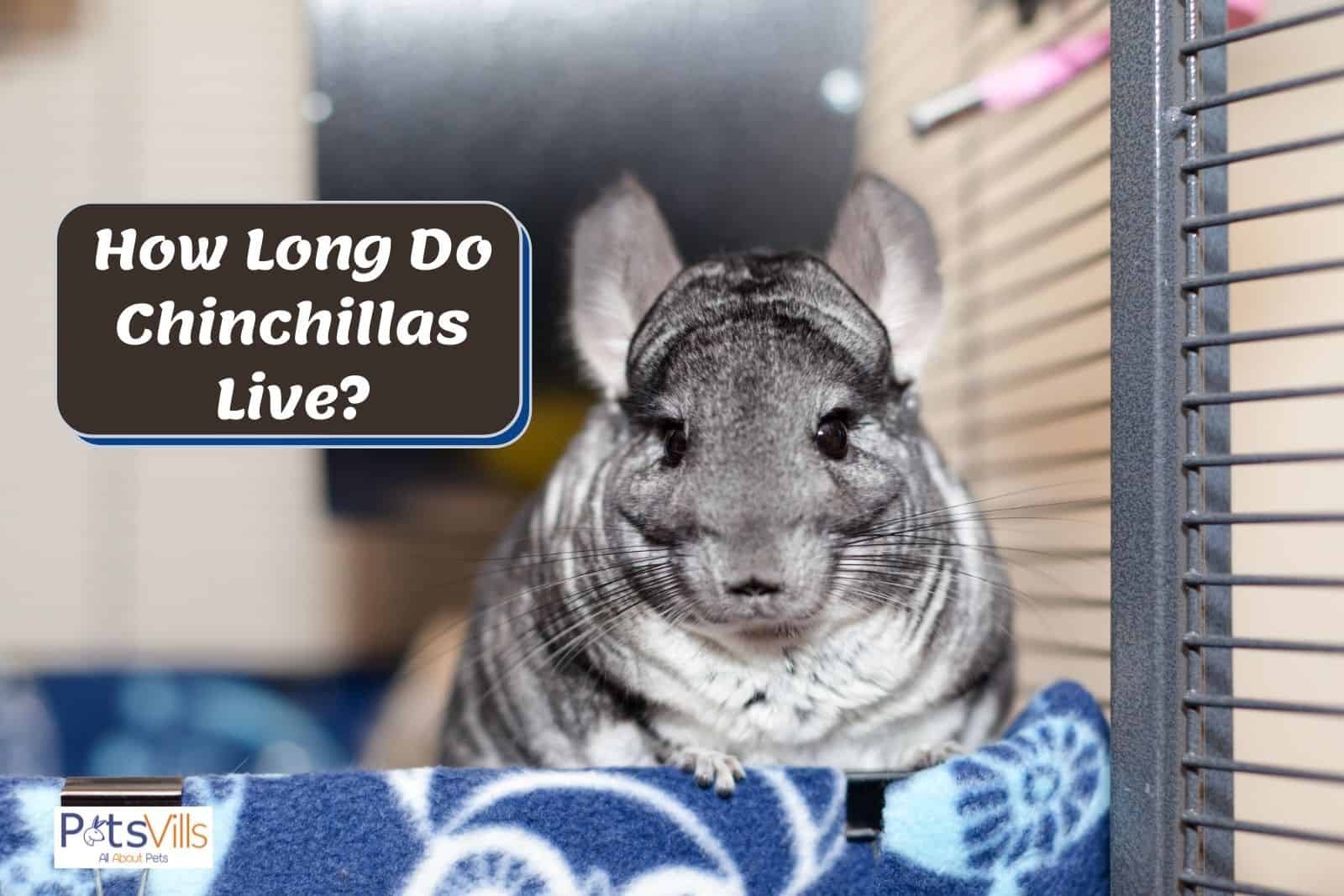Chinchillas can make great pets and due to how long they live they are expected to be around for a long time, but how long do chinchillas actually live for?
How Long Do Chinchillas Live For? A domesticated chinchilla will live for an average of 10 years but can live up to 20 years and beyond. In the wild a chinchilla has an average life of expectancy of 8 – 10 years due to predators.
To make sure your chinchilla lives a long healthy life you need to make sure they have good living conditions and there isn’t anything that could harm or stress your chinchilla out.
READ MORE: Are Chinchillas Nocturnal?
Table of Contents
How Long Do Chinchillas Live?
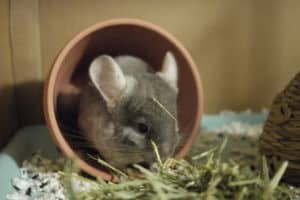
Pet Chinchillas
The average lifespan of a pet chinchilla is between 10 to 20 years.
If the chinchilla has been looked after, given the correct diet and exercise they can even live beyond 20 years.
This is a long time for anyone looking for a long-term companion and that’s why chinchillas are considered to be a great pet (as long as you don’t mind the maintenance that’s required to take care of them).
Chinchillas need to be fed, given water, and let out of their cage daily as well as regular spot cleaning and deep cleaning when needed.
Other rodents that are kept as pets, such as mice, hamsters, and guinea pigs, tend to live considerably shorter. Mice and hamsters usually live between 2 – 7 years and guinea pigs 4 – 8 years.
Find out the chinchilla price!

Wild Chinchillas
In the wild Chinchillas don’t live nearly as long, and have an average life expectancy of between 8 and 10 years.
This is mostly due to the natural predators that prey upon these furry little animals.
Some of the chinchillas’ predators are birds of prey, foxes, snakes, skunks, and wild cats.
Unfortunately, one of the main causes of chinchillas being an endangered species is due to humans. Although they’re illegal to hunt, humans still hunt them (for their soft fur), as well as destroy their natural habitat making their lifespan in the wild even shorter.
When they’re being taken care of by someone properly, meaning they’re being provided the maximum amount of care and nurturing they can get, it will give them on average an extra 5 – 12 years in lifespan.
Nothing is going to keep your chinchilla life longer than providing the proper amount of diet (nutrition), exercise, and love (maintenance and nurturing).
How to Maximize the Lifespan of Your Pet Chinchilla
To maximize the lifespan of your pet chinchilla, there are a few things you can do to make sure your chinchilla is as happy and healthy as possible.
You want to make sure that their environment is as suitable as possible and is the best environment possible for them to live in.
Make sure they are away from other animals that could cause them stress. Cats and dogs can cause chinchillas a lot of stress.
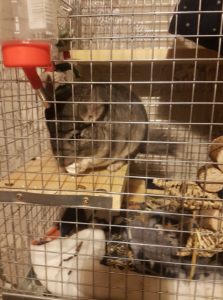
For their environment, you want to give them a large metal mesh cage, put something solid over the metal wires of the cage for the flooring (like wood), because chinchillas can hurt and damage their feet from standing a long time on metal wires.
You’re going to want to buy them hay-based pellet chinchilla food that doesn’t have any morsels, corn, dried fruit, nuts, or seeds and food that contains proper nutrients.
You should make sure that they always have access to timothy hay, freshwater, and safe toys to gnaw on.
For their bedding, you want to make sure to use pelleted paper, or aspen shavings as bedding.
Avoid pine, sawdust, and cedar because they can cause them respiratory problems and other health problems later on.
Chinchillas do far better when they have another companion with them, so if you can provide them with another furry little friend they are going to be a lot happier in their living situation.
Make sure to provide your chinchillas with a lot of space to roam around, and ensure they get adequate exercise, around one to two hours per day is sufficient.
You should them out of their cage daily so that they can get enough exercise and bond with their owners. This will also make the chinchilla safe and secure.
Check: Do Chinchillas Shed a Lot?
Reasons Your Chinchilla Might Die Early
It’s important to realize that no matter how well you take care of any animal, that sometimes things happen that are unpreventable and can’t be foreseen.
There are a few things you can keep in mind that can prevent your chinchilla from dying early.
Choosing the correct exercise equipment is very important for the health of your chinchilla as wire wheels can be very dangerous and hurt your chinchilla’s feet in the long run.
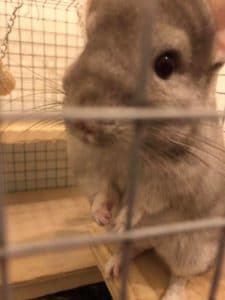
Since chinchillas love to chew on things, make sure when you pick out a cage for your chinchilla that it isn’t made of zinc or galvanized metals.
The best metal for your chinchilla cage should be either aluminum or stainless steel.
The temperature in their environment should be between 59 Fahrenheit (15 Celsius) and 73 Fahrenheit (23 Celsius) and you need to make sure it doesn’t get too hot, as chinchillas don’t have sweat glands so they can overheat.
Make sure not to yell at your chinchilla or have loud sounds playing around them as they don’t like loud noises and can cause them stress.
Keep any large animals away from them to make sure they feel safe. Loud noises and being around large animals that terrify them can affect their mental and physical condition.
It’s important to keep them on a routine when you feed them and give them exercise. If you’re constantly changing their food and don’t have a routine for them to follow this can cause them stress, which can lead to a shorter lifespan.
There are some vegetables that you should avoid when feeding your chinchilla, and this isn’t an all-inclusive list, so please make sure to do some extra research before feeding your chinchilla anything you’re not 100% sure about.
Avoid veggies such as rhubarb (or rhubarb leaves), asparagus, spinach, broccoli, lettuce, peas, and cabbage.
Nuts should be avoided due to having a large fat content that could make your chinchilla very ill.
When buying them toys to gnaw on, make sure that it’s plain wood (or pumice), with no paint, plastic, or wiring.
Sometimes when they chew on things they can accidentally swallow some of the content they’re chewing on and it can get into their digestive system which can cause problems.
It’s important to be very mindful of what you give your chinchilla; from setting up their cage, and liners, to the food you give them, to the toys you let them play with, and the exercise cage that you provide for them.
How to Find a Chinchilla Vet
Giving your chinchilla annual visits to the vet is as important.
It’s important to choose the right vet for you, and make sure that the veterinarian has plenty of experience in dealing with chinchillas.
If you bought your chinchilla from a reputable chinchilla breeder, feel free to ask them for any recommendations on exotic animal veterinarians nearby.
Always do your due diligence and make sure to ask the vets if they’re taking any new small animal patients and ask if they have any experience dealing with chinchillas.
Here are some questions to ask your vet before choosing the right vet for your chinchilla.
- How many chinchillas have you had experience taking care of before?
- What are the most common problems and concerns that you’ve seen when dealing with chinchillas?
- How often do you see chinchillas?
- How long have you been an exotic animals veterinarian for?
It’s also a pretty safe idea when you first get a chinchilla, to schedule a wellness appointment for your newfound friend, just to make sure that they’re healthy when you get them.
Most vets will do this for free. You can also ask your breeder about a health guarantee for your first appointment with the vet and see if they will pay for it (usually it’s free and only takes 10 – 15 minutes).
This will give you a good opportunity to talk more to your vet and get a good feel about how experienced they are in dealing with chinchillas. You can decide afterward if that vet is the right choice for you or not.
Chinchilla Care Tips
When looking after your chinchilla you should stick to a routine and stay on top of the daily maintenance.
You should clean their bedding regularly (twice a week) and change any old food daily. No one likes living in a dirty house, and neither does your chinchilla.
When you’re choosing a cage, you should pick a cage that has a lot of room for them to run around and to climb on things. They like to have different places that they can hide.
Most chinchillas will like the company of another chinchilla. This can make them much happier and will make them live for longer.
If you’re always gone to work or leaving them alone, they can get quite bored. Do your best to give them constant affection and attention, another chinchilla will do wonders in keeping them entertained and occupied.
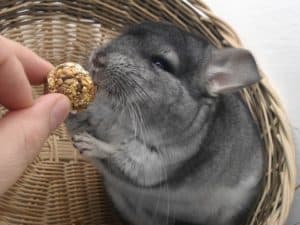
Training your chinchilla. This can take some time and patience.
The best way to get your chinchilla to come to you is to entice it with treats (make sure they are comfortable around you first).
Hold the treat (make sure not to overfeed them) with one hand and lay your other hand palm facing up for them to use that hand to lift themselves high enough to get the treat.
You should give your chinchilla high-quality pet pellets that you can find in pet stores.
Make sure that you give them a constant supply of timothy hay and/or orchid grass.
When it comes to potty training your chinchilla, watch where your pet urinates. This should always be at the same spot in the cage that your pet will designate.
Once they’ve designated their desired spot to urinate in, feel free to place the litter box over that spot after cleaning up after them.
Remember choosing a chinchilla as a pet can be a 20-year commitment. Make sure you are ready to give twenty years of your love for treating this creature with as much time and affection as you can.
Check this video for more useful tips:
FAQs
Why does my chinchilla keep sneezing?
It’s normal for your chinchilla to sneeze occasionally. If they sneeze too much consider taking them to the vets for a checkup. It could be because of dust.
Should I groom my chinchilla?
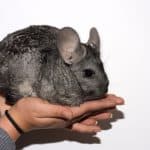
If your chinchilla gets loose hair, clumps, or knots then you should groom your chinchilla. Most of the time they don’t require being groomed.
How do I shorten my chinchilla’s teeth?
If your chinchilla’s teeth are becoming overgrown. Buy them toys and foods that can trim down their teeth. If they’re really overgrown take them to the vets. They can shorten them by cutting them.
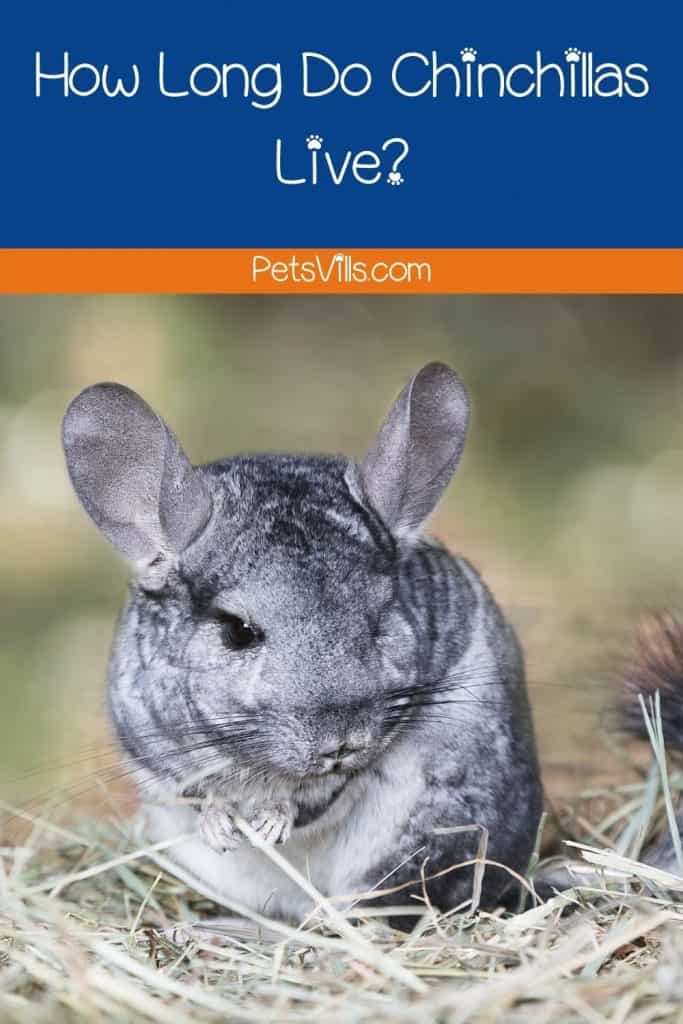
In your case, how long do chinchillas live? Please let us know in the comments below!
Dr. Linda Simon MVB MRCVS is a locum veterinary surgeon who has worked in London for the past 8 years. She graduated top of her class in small animal medicine from UCD, Dublin. She is currently a member of the Royal College of Veterinary Surgeons.
Linda is the resident vet for Woman magazine and a frequent contributor to People’s Friend Magazine, the Dogzone website, Vet Help Direct and Wag! Linda also writes content for the CVS veterinary group, Vetwriter and a number of other establishments.
As well as working in clinic, Linda is an online vet for www. JustAnswer.com where she has been providing online advice for thousands of owners since 2018.
In her spare time, Linda enjoys baking, yoga and running around after her young son!
FIND HER ON: INSTAGRAM

